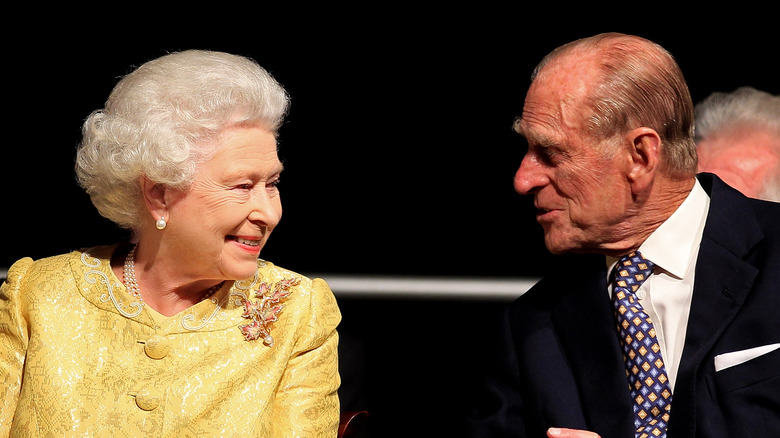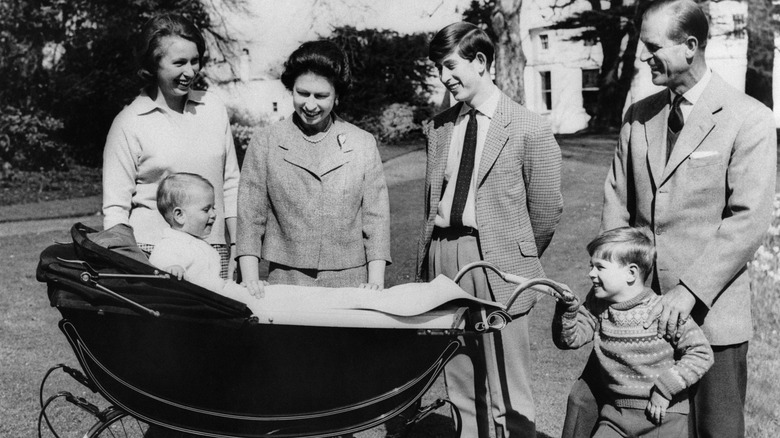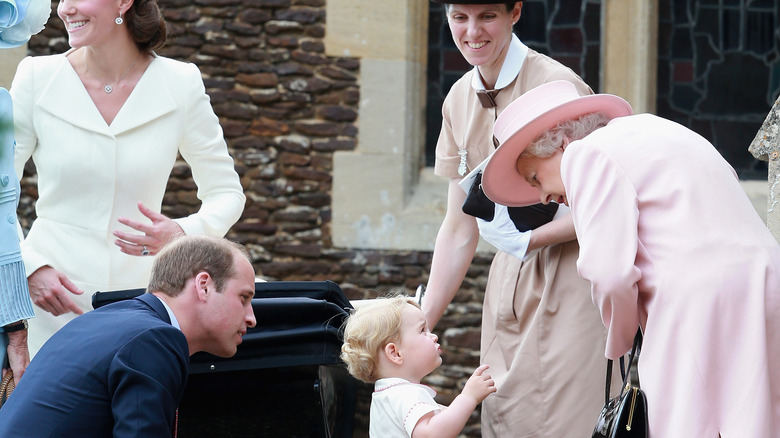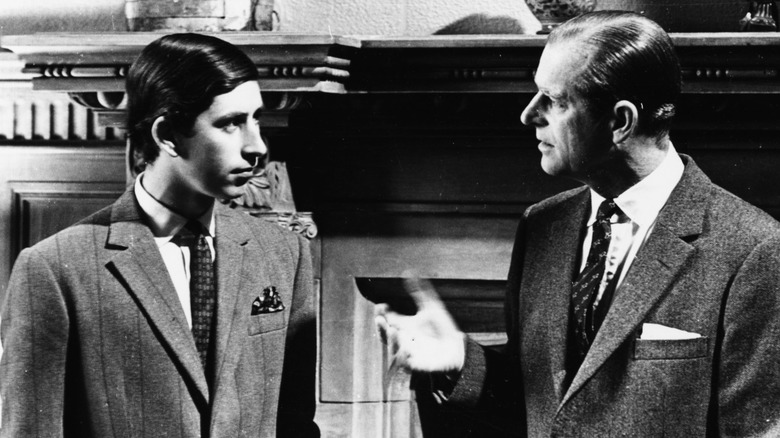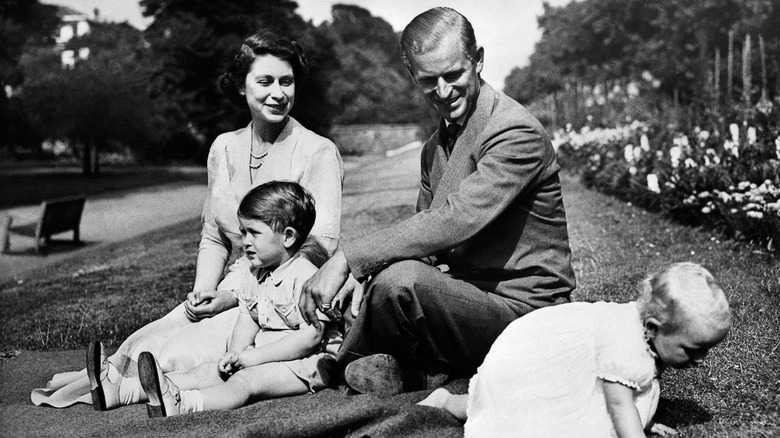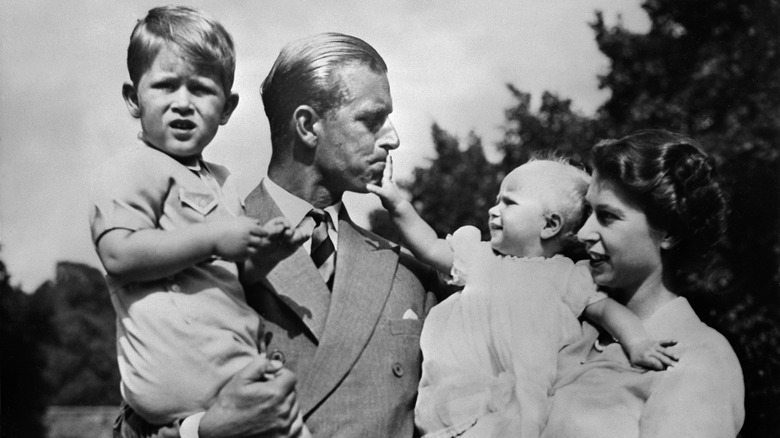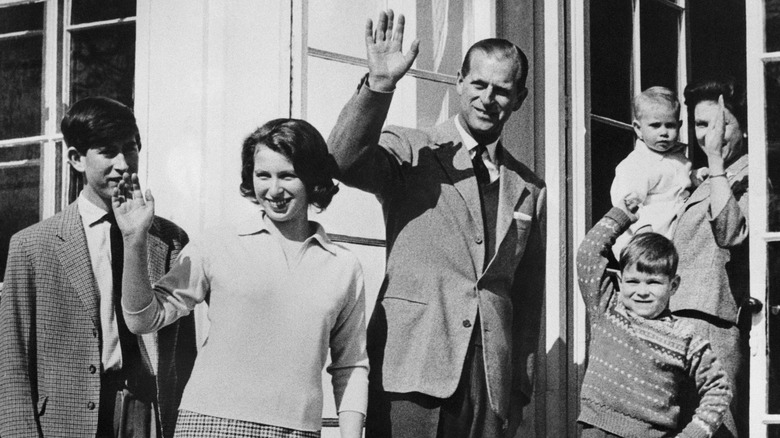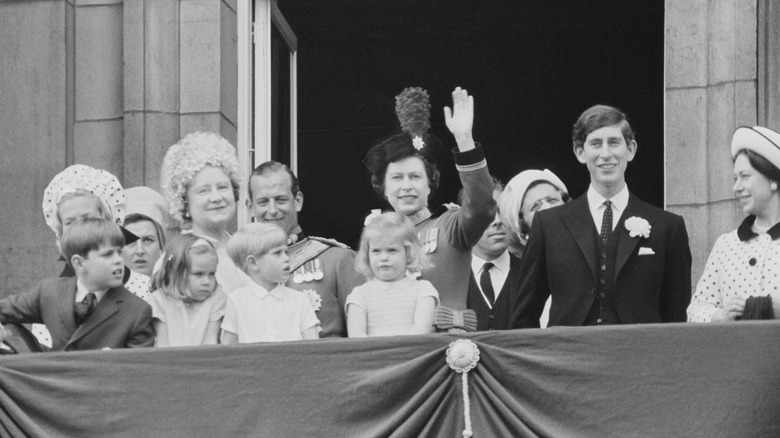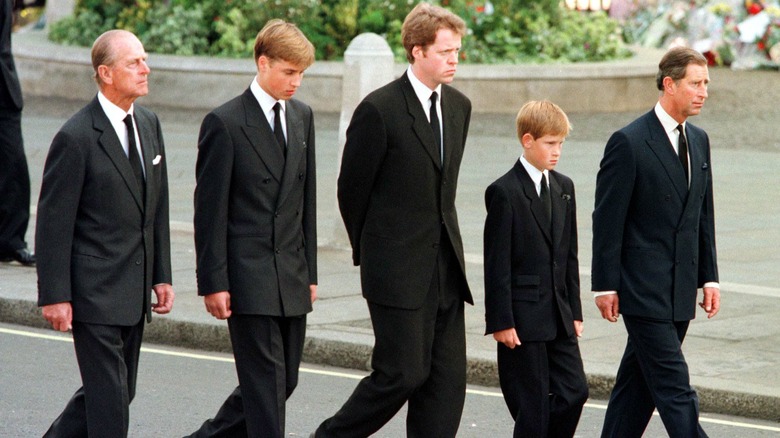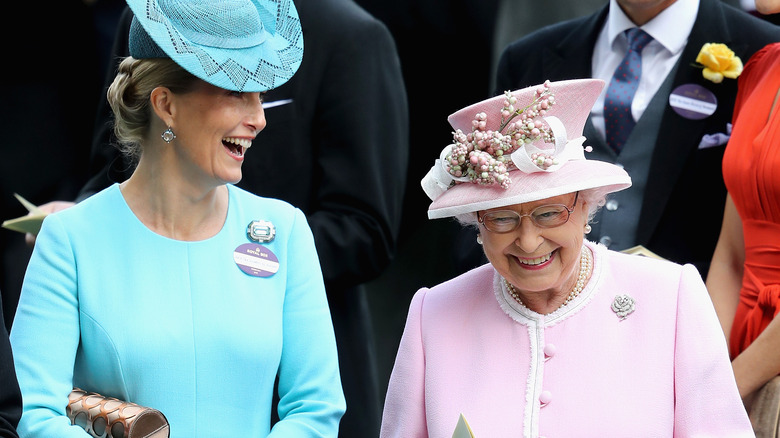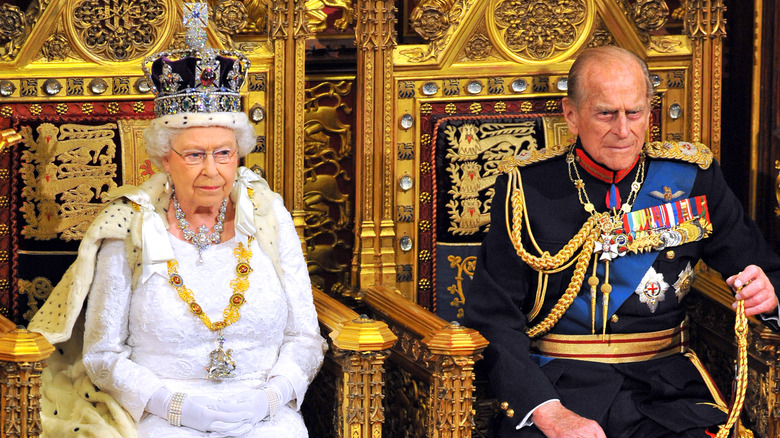The Truth Behind Queen Elizabeth And Prince Philip's Relationship With Their Kids
At some point in your childhood, did you wish to magically transform into a princess? If you had a particularly active imagination, maybe you even thought you'd actually become one someday. Of course, when reality set in, you had to make adjustments in your life plan.
Serving as a princess, or any form of royalty, really, is likely a whole lot better in concept than in reality. Of course, the vast majority of us have never actually been princesses, so we can't comment with any certainty. Yet and still, we do know how Queen Elizabeth II and Prince Philip's children felt about being raised royal.
Spoiler alert: It wasn't always great. In fact, it was downright depressing at times. When your mother is the Queen of England, the family dynamic is bound to get a little complicated — to say the least. Here's the real truth behind the Queen and Prince Philip's relationship with their children.
Children spanning decades
Very soon after getting married, Queen Elizabeth and Philip got busy producing an heir to the throne. Prince Charles was born in 1948, just a year after his parents' wedding and around three years before his mother became the Queen. Next came Princess Anne, who was born one year after her brother Charles. Elizabeth and Philip decided not to have any more children until a decade later. In 1960, the couple welcomed another son, Prince Andrew, and, in 1964, welcomed another boy, Prince Edward.
Marvin G. Knittel, a retired professor of counseling psychology, developed an interesting theory after studying family dynamics. He calls what he discovered the "Knothole Theory". Each sibling in a family views their childhood as if through different knotholes in a fence. They may all be looking at the same thing, but they're coming at it from a different angle, or, a different perspective. How does this relate to the royal family? Well, firstborn Charles' knothole view is quite different from that of his siblings. Let's get his opinion first.
Raising children via nannies
In Jonathan Dimbleby's authorized biography of Prince Charles, Charles is quoted as saying (via Town & Country) that the people who raised him were not his parents, but "inevitably the nursery staff." In yet another biography of the prince, author Sally Bedell Smith reiterated that fact, writing that Queen Elizabeth and Prince Philip only saw their children after breakfast and teatime. So, basically not much at all.
This certainly doesn't sound good, but it doesn't mean the Queen and Philip were horrible people. "She had been brought up in that style herself," Robert Lacy, a historian, advisor for Netflix's The Crown, and author of The Crown: The Official Companion, explained to Town & Country. He further added that the Queen thought it best to have nannies raise her children while she was traveling, rather than bring them along.
Much like his grandparents, Prince William, along with Kate Middleton, also have a nanny for their children. However, they definitely don't shy away from traveling with their kiddos. We can't really fault Queen Elizabeth for gallivanting without her little ones, though. After all, times have certainly changed.
Prince Philip the disciplinarian
Although he may not have spent much time with his parents growing up, Prince Charles still viewed his father as a disciplinarian. Prince Charles: The Passions and Paradoxes of an Improbable Life describes the young prince as having been a sensitive child. This did not exactly sit well with his manly man father. Worried his son would become "weak and vulnerable," he attempted to toughen him up — a belief that undoubtedly makes us all cringe these days.
Patricia Mountbatten, Charles' godmother, explained in the prince's biography that Philip was also very concerned with Charles becoming spoiled. Philip felt some tough love would work to "counteract the spoiling." Philip is also said to have made personal remarks and relied on sarcasm when dealing with not only Charles, but Anne as well. Whereas Charles was sensitive, though, Anne was reportedly a "confident extrovert [who] could push back." You can't help but feel bad for the little prince.
Is Queen Elizabeth a mother "lacking in warmth"?
When Charles would sit with his parents during teatime, it wasn't exactly quality family time. "Somehow even those contacts were lacking in warmth," Martin Charteris, a former longterm senior adviser to the Queen, explained in Prince Charles' biography. He added, "The Queen is not good at showing affection."
This is not just the advisor's opinion. When Charles' parents returned after nearly six months away, both the Queen and Philip proved their standoffishness when it came to their children by not embracing them with long hugs or kisses. Instead, they simply shook hands with their then five-year-old son and three-year old daughter. They weren't a touchy feely family by any stretch of the imagination.
When Charles was four years old, however, the Queen did set out to teach her son horseback riding, but unfortunately for Charles, he said "the whole idea of taking off scared me stiff." It's the thought that counts, right?
The Queen was like any other mother, or so says Princess Anne
Charles and Anne may be close in age, but their perceptions of their childhood experiences are vastly different. In a BBC interview back in 2002, the princess clapped back at the critics who labeled the Queen as an "uncaring mother." Instead of aligning with Charles' beliefs and classifying her mother as lacking warmth, Anne seems to feel that their mom was indeed a loving parent.
Anne further dubbed the royal family a "happy unit" in which they all got along. She explained that, as kids, they "may not have been too demanding" of their mother's time because they recognized her unique position as, you know, ruler of the country and all. They may have been just young children, but, according to Anne, they seemed to have a pretty good idea of what the monarchy entailed — including travel.
Anne clarified, saying, "I don't believe any of us for a second thought she didn't care for us in exactly the same way as any other mother did."
Prince Philip broke royal tradition for one of his kids
While Prince Philip obviously had his fair share of faults when it came to childrearing, he didn't do everything wrong. He actually did some things very right — especially one thing in particular.
Before giving birth to Edward, Queen Elizabeth spent some time perusing women's magazines, according to royal expert Ingrid Seward's book, My Husband and I: The Inside Story Of 70 Years Of Royal Marriage (via Independent). It was in those very magazines that the Queen learned about the benefits of having fathers involved and present for the birth of their children.
The prince obliged and, according to Seward, "was actually holding his wife's hand as their youngest was born on March 10, 1964," thus becoming the first royal father, at least in modern history, to be present for the birth of his child. Witnessing the birth of his son likewise meant he broke the longstanding royal tradition of not being present for childbirth.
Prince Andrew and Edward got more mommy-and-me time
"What fun it is to have a baby in the house again!" Lacey quotes the Queen as saying in his biography of the Queen after Edward was born. According to Lacey, Queen Elizabeth was able to spend a lot more time with her "new children," Andrew and Edward, than she'd been able to with both Charles and Anne.
By the mid-1960s, ruling the country may not have exactly been old hat, but the Queen was surely more comfortable in her role. Unlike the awkward meals she once shared with her oldest son, Queen Elizabeth spent time "cycling and chasing" her kids through Buckingham Palace. Once a week, Edward and Andrew's nanny was given the night off and Queen Elizabeth would take over.
The Queen began to refer to Mabel's night off as her favorite night of the week. She enjoyed putting the boys to bed and even "happily got up in the night" when they would wake up and need soothing before falling back to sleep. She was certainly a more hands-on parent than she was the first time around. Sadly, though, there are no do-overs when it comes to raising kids.
Was Prince Philip a better father-in-law than father?
It's not exactly a secret that Charles and Princess Diana had a relationship that was often fraught with anger, disagreements, infidelity, and essentially everything else that could tear a marriage apart. Diana herself admitted in a BBC interview (via PBS) that part of the reason they stayed together was for appearance's sake.
While Charles and Diana's relationship was falling apart, Diana seemed to have an ally, and one you might not expect. In 2007, The Telegraph released a transcript of letters written to and from Philip and Diana. Although the circumstances behind their release is unimaginably sad (they were read during the inquest into Diana's tragic death), the letters cast Philip in a new, and very caring, light.
Diana fondly referred to her father-in-law as "Pa" and would often end her letters with "my fondest love." Philip wrote Diana saying he hoped they could continue their letter-writing as an "opportunity to exchange views" and reassured her, saying, "I will always do my utmost to help you and Charles to the best of my ability." It's hard not to wonder: Was he a better father to Diana than he was to Charles?
Picking favorites
Who is the Queen's favorite? Perhaps that's an impossible question to ask, but some have surmised that it's not actually one of her own children, rather a daughter-in-law.
According to Express, the monarch's preference is Sophie Rhys-Jones, who married Prince Edward back in 1999. Edward is the only one of the Queen's children who has not gone through a divorce, but that may not be why Rhys-Jones is favored. Queen Elizabeth and Rhys-Jones share a lot of similar interests and spend a good chunk of time together, sometimes riding horses and other times simply relaxing with the grandkids. It doesn't hurt that Rhys-Jones also happens to be married to the Queen's supposed favorite child, Edward, Express explained.
In 2010, the Queen further proved her love for Rhys-Jones when awarding her with the Grand Cross of the Royal Victorian Order, which is Queen Elizabeth's highest seal of approval. There's no doubt about it, this daughter-in-law is in the Queen's good graces.
The Prince and the Queen looking back: "Where did we go wrong?"
Graham Turner, a former senior courtier (or advisor) to the Queen wrote in The Telegraph about a time when Queen Elizabeth and Philip discussed the "desperation they felt about their relationship with their children." Queen Elizabeth implored her husband, "Where did we go wrong?'" and "what can I do now?"
They're the kind of questions that just about break your heart into pieces. Turner said the Queen feels "the most tremendous guilt" that her work often took her away from her family.
When another retired courtier was asked to give his opinion on the Queen's role as a mother, he replied in earnest, "Utterly, utterly lacking, I'm afraid." To make matters worse, the Queen's perceived failure as a parent has also called her rulership into question. By not showing Charles the royal ropes, the courtier thinks she even "made the future of the monarchy less secure." Those are heavy charges, to be sure.
Of course, not everyone thinks of her that way. Some, like the Queen's private secretary Lord Charteris, felt she was in line with the times. Regardless, you're probably not too interested in becoming a princess anymore, are you?
